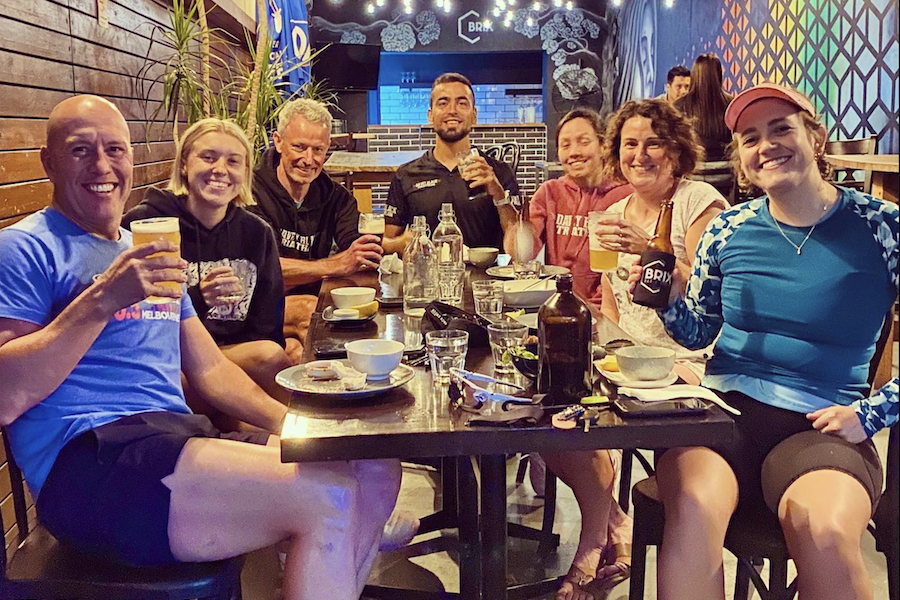Training for a triathlon is a formidable challenge that pushes athletes to their limits both physically and mentally. The combination of swimming, cycling, and running demands exceptional endurance, strength, and determination. However, while intense training is essential, it’s equally important to maintain a healthy lifestyle balance to ensure optimal performance and overall physical and mental well-being. In this blog, Performance Triathlon Coach Steve Davis will delve into the significance of maintaining equilibrium in our daily lives while training for a triathlon.
The Physical Demands of Triathlon Training
Triathlon training is notorious for its rigorous demands on the body. Triathletes must train for three seperate sports, and then also train on how to put them all together. Swimming, cycling, and running place significant strain on muscles, joints, and cardiovascular systems. It’s essential to remember that recovery is just as crucial as training. Overtraining without proper rest and recovery can lead to injuries, fatigue, and burnout. A healthy lifestyle balance involves scheduling rest days, incorporating cross-training, and following a structured training plan designed by a professional triathlon coach to avoid overexertion.
Nutrition as the Foundation
The importance of proper nutrition cannot be overstated when training for a triathlon. A balanced diet provides the energy necessary for workouts, aids in recovery, and ensures overall health. Fuelling your body with the right nutrients helps optimise performance and reduce the risk of injuries. Lean proteins, complex carbohydrates, healthy fats, vitamins, and minerals are all essential components of a triathlete’s diet. The Davey Black Sports Performance Recovery Protein range is the ideal protein supplement to drink after a quality training session or to help top up your daily protein intake requirements. Striking a balance between macronutrients as well as staying adequately hydrated helps maintain energy levels and supports the body’s recovery process. The Davey Black Triathlon Club’s amazing Clinical Nutritionist, Melissa Laity is always on hand to help you with your nutritional requirements.
Quality Sleep for Optimal Recovery
Sleep often takes a backseat in the midst of intense training, a high workload and a busy life schedule, but its role in performance cannot be underestimated. During sleep, the body repairs muscles, consolidates memory, and releases growth hormones. Failing to get adequate sleep can lead to decreased cognitive function, impaired decision-making, and a weakened immune system. Integrating a healthy sleep routine into your lifestyle balance ensures that your body is prepared for each training session and can recover effectively.
Managing Stress and Mental Well-being
Training for a triathlon isn’t just a physical endeavour, it’s a mental challenge as well. The pressure to perform, the monotony of repetitive workouts, and the juggling of training with other life commitments can lead to elevated stress levels. Stress, if left unchecked, can negatively impact both training and your overall health. Incorporating stress-reduction techniques such as Yoga, meditation, mindfulness, and relaxation exercises into your routine can help maintain a healthy balance between physical and mental well-being.
Maintaining Relationships and Social Connections
Triathlon training can sometimes become an all-consuming endeavour, causing individuals to withdraw from social activities and neglect relationships. However, having a support system is crucial during such demanding times. Friends, family, and fellow athletes can provide emotional support, encouragement, and a sense of belonging. Prioritising social connections and making time for loved ones can counterbalance the isolating effects of rigorous training. The Davey Black Triathlon Club Melbourne has an amazing sponsor in Brix Bar & Beer Garden and we have regular get togethers to socialise, relax and unwind outside of the training environment.
Long-Term Athletic Development
While it’s natural to focus on the immediate goals of completing a triathlon, it’s essential to think about long-term athletic development as well as family, life and relationships. Striving for a healthy lifestyle balance during training not only benefits performance in the short term but also contributes to an athlete’s sustainability in the sport. Overtraining and neglecting self-care can lead to burnout, injuries, and a loss of enthusiasm for the sport. By maintaining a holistic approach to training, athletes can continue to improve and enjoy triathlon for years to come.
The Results
Training for a triathlon is a remarkable journey that requires dedication, discipline, and passion. However, the path to success shouldn’t come at the cost of overall well-being. Striking a healthy lifestyle balance ensures that athletes are not only physically prepared for the challenges of the race but also mentally resilient and emotionally fulfilled. By prioritising rest, nutrition, sleep, stress management, relationships, socialising and long-term development, triathletes can experience the true essence of the sport while still achieving their personal bests.

